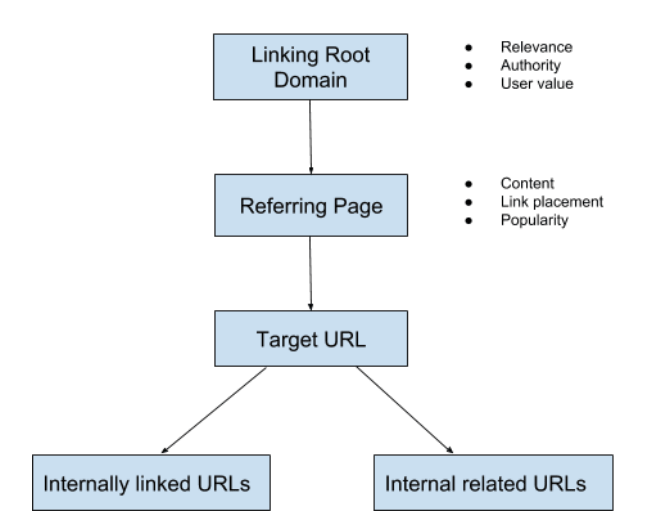
Link building helps your SEO performance by passing authority from third-party relevant domains to your domain and landing pages. Most authority is passed directly to the hyperlinked URL, which then gets spread through your domain to that’s URL closest, and most related, pages. This contributes to the likelihood your pages will rank higher in search engines for their target keywords, but it is only one of over one hundred ranking signals search engines take into account.
Link building is a cornerstone of SEO and one of the most difficult activities to get right. However, not much is thought about or discussed regarding how links contribute to a website’s ranking potential, and the further implications link building may have.
This post won’t intentionally dive into the tactics and techniques of link building – I’ll save that for another day – but it will look at the theory behind links, different scenarios and how the flow of equity should be altered based on the anatomy of the link.
How does link equity flow?
Excuse the clip-art style imagery, but experience has taught me this is how a link passes value to a target landing page, its wider domain and some key factors considered by search engines at each stage:
When a link comes into a landing page, as highlighted above, there are many factors taken into account by search engines. These all have an impact on the equity passed over and the impact it has on that page to rank, as well as the wider domain.
Example A – The good
Let’s use an example and the fancy diagram above. If for instance I run a mobile phone blog, making my money affiliating with networks, retailers, recycling providers, etc. there’s little chance I’m getting links naturally. So I need to create content that gets writers interested, and preferably technology writers, whose target audience is well aligned with mine.
So I run a survey to discover the happiest mobile phone owners, to discover which networks they’re on, their operating system and crucially, their manufacturer (because everyone wants to pit Apple against Samsung). I then post the results, along with a visual of my results on my blog and outreach the results to technology writers. Cultofmac.com become interested in my results, and publish an article linking back to my blog post.
The anatomy of this starts to look extremely promising for my blog. I have a highly authoritative, relevant domain linking through to me, with an engaged audience who care about technology and share the content themselves. The link is also in editorially crafted copy, using a descriptive anchor, featured in a prominent location and with no sign of a nofollow in the HTML source code for good measure! This is good news.
The flow of equity at this point is hitting its peak powers. If you’re a search engine, you’re looking at this link, crawling the semantic copy surrounding the link, already know the relevance and authority of the linking root domain (Cultofmac.com), and passing all of that juicy link equity over to mobile phone blog, who you already kinda know about, but are sure I’m aiming my content at phone and technology lovers, so this is definitely looking legit.
My blog post at this point is gaining major props. It’s likely it’ll start to rank for terms like ‘happiest mobile phone owners’ and maybe even ‘best mobile phone company’ (if I’ve partially done some keyword research and optimised my targeting accordingly). However, my page is now a pool of overflowing link equity, and is being funnelled through my domain, dropping droplets of link equity off at the pages I’m internally linking to, and also any potentially related content search engines know I have (through their historic, and now more recent, crawls).
My homepage all of sudden becomes a bit more competitive for its’ target keywords. My page on iPhones starts to inch up on search visibility because I linked through to it from my survey results page. I’m all around gaining ground because of this link, albeit in not extremely competitive search queries. Yet.
This is what you should be aiming for.
Example B – The bad (or just…less good)
This time, my mobile phone blog can’t really invest in a survey, so I need to get a little creative and start using some content-less link building tactics. First stop Google, and I look for “mobile phone blog inurl:links”.
Pretty quickly, I discover this little gem of a page, readily linking out to websites just like mine:
http://www.fonebiz.co.uk/useful-links/index.htm
So I get in touch, and hazaar, they’re super cool and happily add a link back to my blog’s homepage.
Google come along, and what happens to the link equity? Let’s think about it from their perspective. There are some upsides. This is a mobile phone centric domain, and this page is clearly dominated by links to other mobile phone related domains. Therefore, relevancy is looking pretty strong. There’s also at least a bit of authority about the link, with this URL punching in with a Trustflow of 11, and the domain 10. So there’s some value that’s going to be passing over.
However, that’s pretty much where it stops. It’s a link, and one that provides a little value, but we’re one link in a list of many. Search engines rightly know the chances of a user clicking through to my domain are slim, and so therefore the equity gets diluted off the bat. This page is also rarely crawled (having been cached a month prior) signalling that it likely doesn’t change that much and search engines aren’t paying too much attention to it.
Overall, our domain isn’t likely to get much of a boost from this, so therefore isn’t the best ROI for my time. We may see a little promise depending on how authoritative my blog is (the less authoritative, the more lower quality links will have a positive impact for me), but we’re not expecting to start ranking for ‘best mobile phones’ just yet.
Example C – The ugly
I haven’t built a link in over a month and I’m starting to get a little desperate. I know they’re important, so I’m pumped when I get an email out the blue with a DA25 website accepting guest posts with 2 follow links in the copy. Why do people struggle with link building when it’s this easy!?
My article goes live. I wrote 800 words on the ‘best mobile phones’ (my anchor text ; ) …twice). Nothing much happens to my rankings, then a month later, I get a notice from Google Webspam team telling me I have some unnatural links in my profile. Uh-oh.
So what happened? Google, fortunately for them and their users, did a little more digging than I originally did. Their core understanding of the linking root domain is that it’s a travel blog, which also seems to have recent articles on ‘7 tips for weight loss’ and ‘The best air-fryers on the market today’, all with very different writing styles.
Google’s understanding of my link starts to really take a turn. They’ve found a link from a domain that clearly ticks the boxes of having little editorially controlled value, no defined user base, no relevance to me at all and is using optimised anchor texts. The link equity at this point has actually turned into a negative, prompting Google to contact me about my profile and warn of manual action against my domain.
This is the stuff to avoid as the link equity here is null and void, and we can clearly evaluate at each point which boxes our links are ticking and which they really aren’t.
As I said at the start of the article, link building is a cornerstone of SEO. Relevant domains linking to each other when they have good content is a strong signal that a page should be delivered when a search engine’s user is looking for related queries.
However, not all links are created equal.
They pass over equity based on a myriad of factors that I’ve touched on here, hopefully to help you consider how to approach link building and how to evaluate what’s likely to lead to ranking improvements for your domain.

